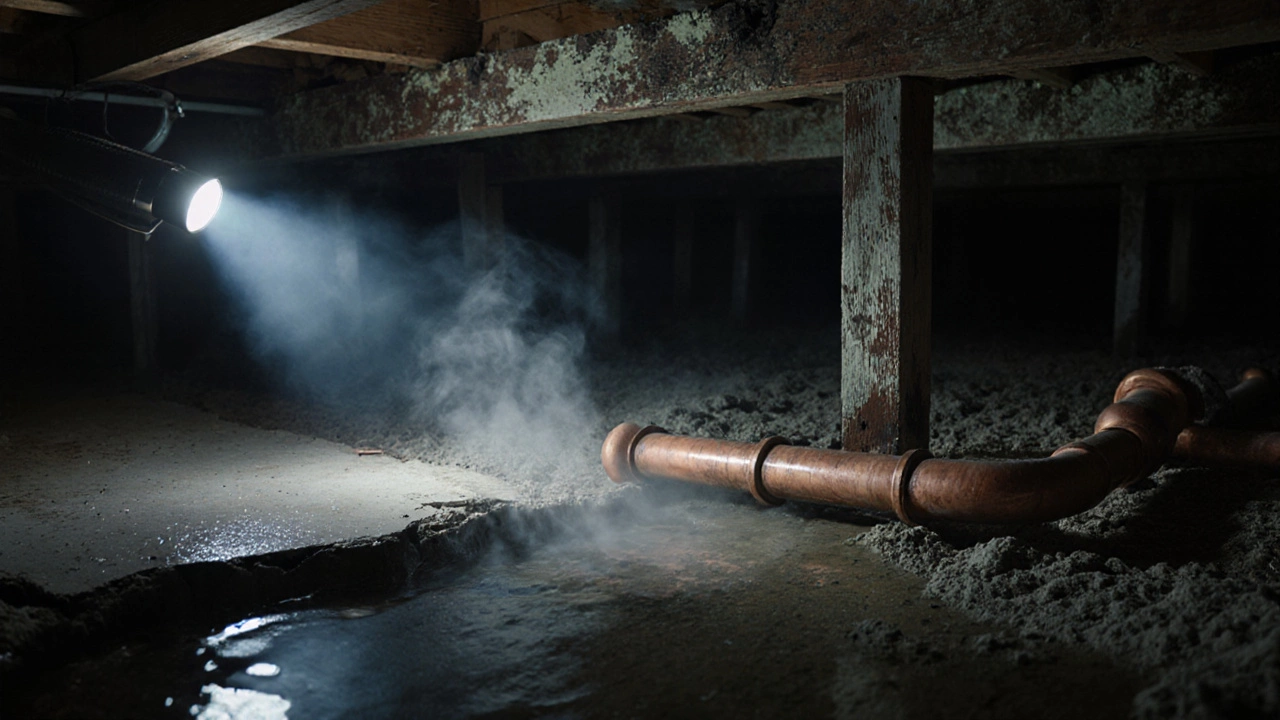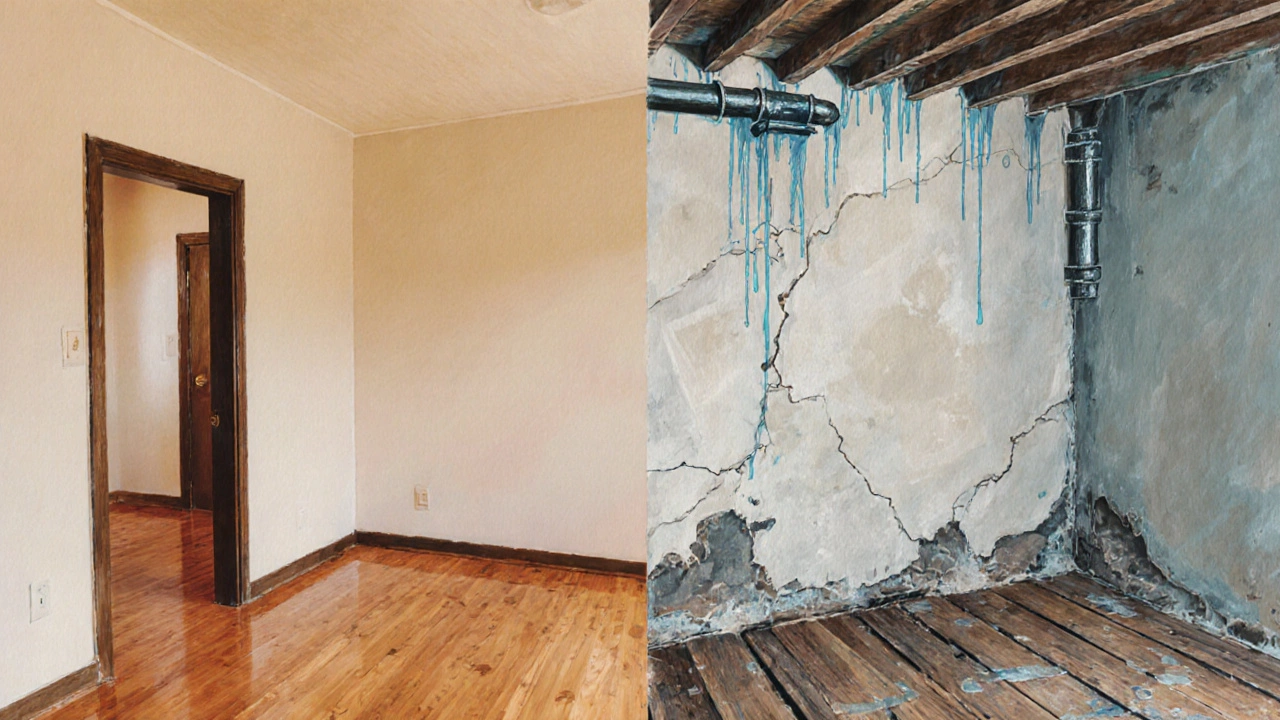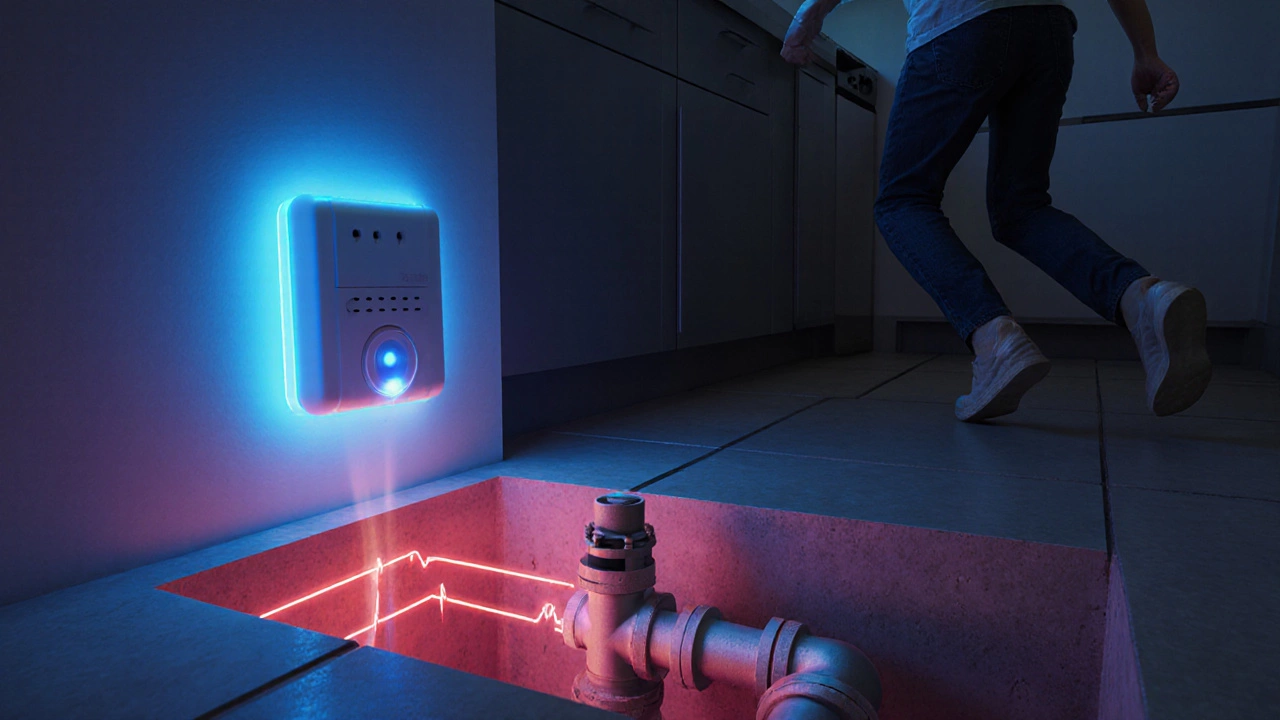Does Homeowners Insurance Cover Broken Pipes Under Foundation?
 Nov, 24 2025
Nov, 24 2025
Homeowners Insurance Coverage Calculator
Check Your Coverage
Answer these questions to see if your pipe leak is likely covered by standard homeowners insurance
If you’ve noticed a sudden spike in your water bill, damp spots on your floor, or the sound of running water when no taps are on, you might be dealing with a broken pipe under your foundation. And if you’re asking, does homeowners insurance cover broken pipes under foundation? - you’re not alone. This is one of the most common and confusing insurance questions homeowners face, especially in older homes or areas with shifting soil.
Most Homeowners Insurance Policies Don’t Cover the Pipe Itself
Homeowners insurance in New Zealand and most other countries is built to protect against sudden, accidental damage - not wear and tear. That means if a pipe under your foundation cracks because it’s 30 years old, corroded, or slowly leaking from mineral buildup, you’re out of luck. Insurance won’t pay to replace or repair the pipe itself. These are considered maintenance issues, not covered perils.Think of it like a car engine that fails after 150,000 kilometers. You don’t expect your auto insurance to cover the repair. Same logic applies here. Plumbing systems degrade over time, and that’s your responsibility as a homeowner.
What You Are Covered For: Water Damage
Here’s where it gets important. While the pipe itself isn’t covered, the water damage caused by that broken pipe often is. If a hidden leak bursts and floods your subfloor, warps your timber framing, or ruins your drywall and insulation, your policy will typically cover the cost to fix those structural and interior damages.In Wellington, where homes often sit on sloped, clay-rich soil, sudden pipe bursts can lead to serious foundation movement. If that movement causes cracks in your walls, doors that won’t close, or uneven floors - those repairs may be covered, as long as the root cause was a sudden leak, not gradual seepage.
For example: A 1980s home in Karori has a corroded copper pipe under the slab. One night, it ruptures. Water floods the crawl space, lifts the concrete slab slightly, and causes a 15mm crack in the living room wall. The insurance company will pay to repair the wall, dry out the subfloor, and replace damaged insulation - but not to dig up and replace the old pipe.
What’s Not Covered: Gradual Leaks and Neglect
Insurance companies are very strict about distinguishing between sudden damage and slow leaks. If your pipe has been dripping for months - and you ignored puddles, mold growth, or musty smells - they’ll likely deny your claim. They’ll point to your failure to maintain the property.Adjusters look for signs like:
- Mold that’s been growing for over six months
- Water stains that match old repair attempts
- Soil erosion under the slab that matches long-term seepage
- Previous complaints or repair invoices you didn’t report
Even if you didn’t notice the leak, if an inspector can prove it was ongoing for more than 30 days, coverage gets denied. That’s why regular inspections matter - especially in homes older than 25 years.

What About Foundation Damage?
This is the trickiest part. If water from a broken pipe weakens the soil under your foundation, causing it to shift or settle, your policy might cover the resulting structural damage - but only if the water damage was sudden and accidental.Let’s say a pipe bursts and floods the soil beneath your house. The ground turns to mud, your foundation tilts, and your chimney cracks. If you can prove the burst was sudden (like a pressure surge or pipe fracture), your insurance will likely pay for foundation repairs. But if the pipe leaked slowly for a year, softening the soil over time - that’s not covered. Foundation repair from gradual erosion is always excluded.
Many policies have a specific exclusion for “earth movement,” which includes settling, cracking, or shifting due to water saturation. So even if the water came from a covered event, the foundation damage might not be.
What You Can Do: Prevention and Extra Coverage
You can’t control every pipe failure - but you can reduce the risk:- Install a water leak detection system (like Flo by Moen or Govee Smart Water Sensors). These shut off your main valve if they detect abnormal flow.
- Get a plumbing inspection every 3-5 years, especially if your home was built before 1990.
- Know where your main water shutoff is. In Wellington’s wet winters, being able to turn off water in 10 seconds can save thousands.
- Consider adding “Sewer Backup Coverage” or “Hidden Plumbing Coverage” as an endorsement. It’s not standard, but some insurers offer it for an extra 10-15% on your premium.
Some insurers in New Zealand now offer optional add-ons that cover the cost to locate and access hidden pipes under slabs - even if they don’t pay for the pipe replacement. That alone can save you $2,000-$5,000 in excavation fees.

What to Do If You Have a Leak
If you suspect a broken pipe under your foundation:- Turn off your main water supply immediately.
- Take photos of visible damage: wet floors, cracks, mold.
- Call a licensed plumber to confirm the source and extent of the leak.
- Document everything - dates, times, repair quotes, and communication with your insurer.
- File your claim within 48 hours. Delays can trigger suspicion of neglect.
Don’t wait to clean up the mess. Insurance adjusters need to see the damage as it happened. If you dry everything out before they arrive, your claim could be weakened.
Insurance Claims: Real-World Outcomes
In 2024, a Wellington homeowner filed a claim after a pipe burst under their concrete slab. The insurer approved $18,500 for:- Drying out the subfloor ($4,200)
- Replacing damaged timber framing ($7,800)
- Repairing cracked plaster and flooring ($6,500)
But they denied $12,000 for pipe replacement and $8,000 for foundation re-leveling. Why? The plumber’s report showed the pipe had been leaking for at least 11 months. The foundation shift was ruled gradual, not sudden.
Another claim in Porirua succeeded because the homeowner had a smart water shutoff system. It detected the burst within minutes, turned off the water, and sent an alert. The damage was minimal - just $2,100 in carpet replacement. The insurer paid in full.
Bottom Line
Does homeowners insurance cover broken pipes under foundation? No - not the pipe. But yes - to the damage it causes, if the leak was sudden and you acted fast. Your policy protects your home’s structure and interior from water disasters, not your aging plumbing system.Prevention is cheaper than repair. Regular checks, smart sensors, and quick action can save you from a $50,000 foundation nightmare. Don’t wait for a flood to learn the rules.
Does homeowners insurance cover the cost to find a hidden pipe leak?
Some policies cover the cost of locating a hidden leak under the foundation if it’s part of a covered water damage claim. This includes using cameras, acoustic listening devices, or pressure testing. But if the leak is ruled gradual or due to poor maintenance, even locating it won’t be paid for. Always check your policy’s fine print or ask your insurer about ‘leak detection coverage’ as an optional add-on.
What if the broken pipe causes my house to sink?
If the pipe burst suddenly and the water saturated the soil, causing rapid foundation movement, your insurance may cover foundation repairs. But if the pipe leaked slowly over months or years, the sinking will be seen as gradual damage - and excluded. Soil erosion from long-term seepage is never covered. You’ll need to pay for foundation re-leveling yourself.
Can I get insurance that covers pipe replacement under the foundation?
Standard policies don’t cover pipe replacement. But some insurers offer optional endorsements like ‘Hidden Plumbing Coverage’ or ‘Utility Line Coverage’ that pay for replacing buried pipes - even under slabs. These cost extra (usually $50-$150/year) and have limits (often $10,000-$20,000). Ask your broker if they offer this add-on. It’s worth it for homes over 30 years old.
How long do I have to file a claim after finding a leak?
Most insurers require you to report water damage within 48 to 72 hours. Delaying can make them suspect negligence - especially if mold or structural damage has spread. Some policies give you up to 30 days, but the sooner you act, the better your chances of approval. Take photos, turn off the water, and call your insurer before cleaning anything.
Are older homes more likely to be denied claims for pipe leaks?
Yes. Homes built before 1990 are more likely to have galvanized steel, cast iron, or early PVC pipes that corrode or crack over time. Insurers know this and are quick to assume leaks in older homes are due to wear and tear. To improve your claim chances, keep records of plumbing inspections and upgrades. Proving you maintained the system helps fight denial.
